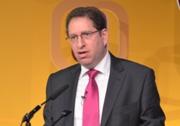The future for #FunctionalSkills after two years of delivery

Functional Skills have only really been delivered by providers for two years but they are now well understood and accepted by employers and individuals.
Within Traineeships and Apprenticeships, Functional Maths and English are accepted as an equal alternative to GCSEs.
We know that the Department of Education remain committed to improve the current GCSE and want to ensure that all young people get a good standard of English and maths at Grade C. Unfortunately the school system is failing far too many young people and there are still far too many that leave school without that basic skill. As a result, post 16 training providers have to re-engage those young people and try and build their confidence and skills in these subjects.
Retaking GCSEs will not be right for many of those young people. GCSE is also not right for many adults who need to improve their literacy and numeracy in work and Functional Skills have to be the route for them, having arrived at the right time. The BIS 2011 Skills for Life Survey found that while literacy levels had been improving among 16 to 65 year olds since 2003, the achievement of numeracy at entry level 3 (expected at primary school leaving age) and above had actually shown a small decrease over the same period. In raw numbers, an estimated 8.1 million adults in 2011 had entry level 2 or below numeracy skills.
So Functional Skills were needed and after being piloted by 3,000 providers, including work based learning providers, they are here to stay. This was confirmed by the recent clarification issued by the DfE and BIS who acknowledged that Functional Skills had an important role to play in improving these basic skills. This has now also been supported in our discussions with the new Skills Minister Nick Boles. This is a welcome approach to a subject where we all have the same objective to improve the level of theses key skills. The minister has asked Ofqual to look at Functional Skills to ensure they are rigorous and effective and their findings will be welcome because we know we need to improve the understanding of these qualifications and improve the teaching and support of learners.
We have to get to the stage where Functional Skills are seen as an equal qualification to GCSEs which means we may have to look at the core content to ensure it meets employers’ needs and to look at all of the issues that will improve the understanding of the qualification. This may mean that we need to look at the name. Calling them ‘Functional Maths’ and ‘Functional English’ may be enough; or perhaps we can move to something that would recognise them as a Literacy GCSE or Numeracy GCSE.
If we are to build the credibility of Functional Maths and English, we have to ensure that they are not seen as a second rate option. That means we have to stop calling them ‘stepping stone’ qualifications and we need to be clear to employers that they are a real alternative to GCSE.
We also need to raise the level of teaching and support for learners in the workplace. This requires developing new specialist teachers and tutors in work based learning as well as supporting vocational trainers who deliver a lot of support for English and maths in the workplace. The Education and Training Foundation are developing a range of support programmes for specialist teachers and it will be important to include vocational tutors who have an important part to play.
With an increasing acceptance that GCSE will not replace Functional Skills and a commitment to improve the quality of delivery, we can ensure that individuals, young and old, have an alternative route to improving these essential work skills.
Stewart Segal is chief executive of the Association of Employment and Learning Providers











Responses